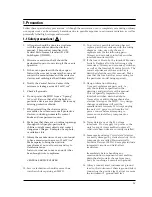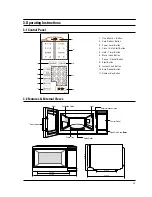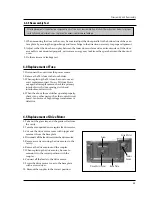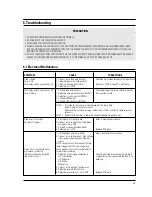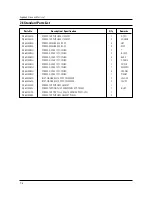
5-3
The output power of the magnetron can be measured by performing a water temperature rise test.
Equipment needed :
* Two 1-liter cylindrical borosilicate glass vessel (Outside diameter 190 mm)
* One glass thermometer with mercury column
NOTE: Check line voltage under load. Low voltage will lower the magnetron output. Make all temperature
and time tests with accurate equipment.
1. Fill the one liter glass vessel with water.
2. Stir water in glass vessel with thermometer, and record glass vessel's temperature ("T
1
", 10±0.2ûC).
3. After moving the water into another glass vessel, place it in the center of the cooking tray. Set the oven to high
power and operate for 48 seconds exactly. (1 seconds included as a holding time of magnetron oscillation:)
4. When heating is finished, stir the water again with the thermometer and measure the temperature ("T
2
").
5. Subtract T
1
from T
2
. This will give you the water temperature rise. (
D
T)
6. The output power is obtained by the following formula;
7. Normal temperature rise for this model is 9.9ûC to 10.5ûC at 'HIGH'.
NOTE 1: Variations or errors in the test procedure will cause a variance in the temperature rise.
Additional power test should be made if temperature rise is marginal.
NOTE 2: Output power in watts is computed by multiplying the temperature rise (step 5) by a factor of 91
times the of centigrade temperature.
4.187 x 1000 x
D
T+0.88xMcx(T
2
-T
0
)
Output Power =
46.5
(IEC)
46.5: Heating Time (sec)
4.187 : Coefficient for Water
1000 : Water (cc)
D
T : Temperature Rise (T2-T1)
Mc : Cylindrical borosilicate glass weight
To : Room temperature.
5-8 Output Power of Magnetron
Alignment and Adjustments
CAUTION
MICROWAVE RADIATION
PERSONNEL SHOULD NOT ALLOW EXPOSURE TO MICROWAVE RADIATION FROM MICROWAVE GENERATOR OR OTHER PARTS
CONDUCTING MICROWAVE ENERGY.
The microwave heat distribution can be checked indirectly by measuring the water temperature rise at
certain positions in the oven:
1. Prepare five beakers made of 'Pyrex', having 100 milliliters capacity each.
2. Measure exactly 100milliliters off water load with a measuring cylinder, and pour into each beaker.
3. Measure the temperature of each water load. (Readings shall be taken to the first place of decimals.)
4. Put each beaker in place on the cooking tray as illustrated in figure below. Start heating.
5. After heating for 2 minutes, measure the water temperature in each beaker.
6. Microwave heat distribution rate can be calculated as follows:
Minimum
Temperature Rise
Heat Distribution =
X 100(%)
Maximum
Temperature Rise
The result should exceed 80%.
5-9 Microwave Heat Distribution - Heat Evenness
D
D
D/4
D/4
D/4
D/4
Cooking Tray
Beaker


